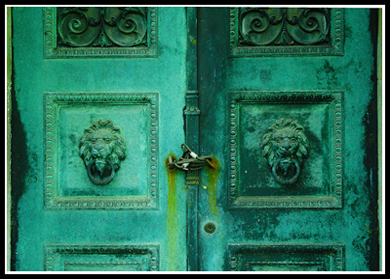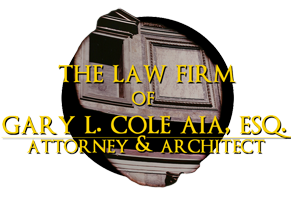
HISTORIC PRESERVATION ATTORNEY, ARCHITECT & EXPERT WITNESS. Gary L. Cole AIA, Esq. is a strong supporter of local, state and national efforts for maintaining the historic assets that communicate our nation’s shared past. But he also believes that for those efforts to be effective, they must be balanced with respect for the legal rights of private and public property owners. This means, among other things, that local, state and federal historic preservation laws and administrative procedures must be equitably and transparently applied, and expressed in clear and unambiguous language understandable to everyone – regardless of academic or professional credentials.
It also means that public support for landmarking and historic rehabilitation should be cultivated, not coerced. Communication should be clear in a shared language, not opaque in undefined industry jargon.
That starts with good laws and good interpretations of those laws by those who understand both the legal and the substantive nature of historic properties.
Mr. Cole is a Chicago based, Illinois and Florida licensed attorney and an Illinois licensed architect – one of the few individuals in the United States possessing licenses in both law and architecture. He is able to provide his historic preservation expert witness and consulting services throughout the United States.
In addition to his other professional qualifications, he meets the National Park Service’s professional requirements to be an Historical Architect. He is also a Historic Preservation Attorney and Historic Preservation Architect and is the co-author of a legal treatise on historic preservation law published by the Illinois Institute of Continuing Legal Education. He is a former Historical Architect for Illinois’ state historic preservation office (SHPO) – the Illinois Historic Preservation Agency – where he was involved in the program administration of hundreds of historic properties. He has spoken at local, state, national and international historic preservation conferences.
Mr. Cole is also a former Visiting Associate Professor of Architecture at the University of Illinois’ Graduate School of Architecture, Historic Preservation Option. He has also taught at Chicago’s School of the Art Institute, in its historic preservation program.
EXPERT WITNESS & CONSULTING SERVICES
In addition to his other construction law, accessibility law, arbitration and mediation legal services, Mr. Cole can provide Expert Witness Consulting services to attorneys involved in local, state and national historic preservation disputes involving property landmarking, historic property rehabilitation, federal historic tax credit and other tax-benefit programs, Section 106 of the National Historic Preservation Act regulatory compliance, and other historic preservation related matters.
He has served as an expert witness in historic preservation civil and local administrative disputes, including landmarking disputes involving local governments and private parties, and in federal litigation involving historic properties with Americans with Disabilities Act (ADA) considerations. He can assist attorneys with a wide range of historic preservation disputes, including landmarking issues, as a consulting expert witness.
SELECT HISTORIC PRESERVATION ATTORNEY & ARCHITECT EXPERIENCE
HISTORIC PRESERVATION ATTORNEY. As a Historic Preservation Attorney he has assisted developers and property owners in both objecting to and obtaining National Register of Historic Places and local landmark designation status; with obtaining federal Historic Rehabilitation Tax Credit Program and state Historic Property Tax Assessment Freeze Program tax benefits; with appealing the denial of federal Historic Rehabilitation Tax Credits before the National Park Service in Washington, D.C.; and, with Section 106 of the National Historic Preservation Act of 1966 regulatory compliance. He has been involved with historic commercial and residential projects from Chicago to Miami Beach and Palm Beach, and in Washington, D.C.
HISTORIC PRESERVATION ARCHITECT. As a former Historical Architect with Illinois’ State Historic Preservation Office (SHPO) – the Illinois Historic Preservation Agency (IHPA) – Mr. Cole has an insider’s understanding of the laws and workings of local, state and federal historic preservation regulatory entities. While at the IHPA, he conducted hundreds of historic property site inspections for federal Historic Rehabilitation Tax Credit and state Historic Property Tax Assessment Freeze projects for their compliance with The Secretary of the Interior’s Standards for Rehabilitation; in connection with Section 106 of the National Historic Preservation Act of 1966 regulatory compliance; and, assisting with National Register of Historic Places and local landmarking efforts. He was also a member of the 1993 National Trust’s Mississippi River Flood Relief Program working with the FEMA assisting in the recovery of flooded historic towns along the Mississippi River.
Mr. Cole is a former Visiting Associate Professor of Architecture at the University of Illinois’ Graduate School of Architecture’s Historic Preservation Program, where he taught courses on historic building investigation and documentation, historic material pathology and forensics, and hands-on traditional construction methods.
HISTORIC PRESERVATION LEGAL SERVICES
Development Financial/Economic Incentives Legal Services
Many commercial and residential historic rehabilitation projects are eligible for various types of development financial incentives. However, most of these incentives have complicated, and often vague requirements – such as the federal Secretary of the Interior’s Standards for Rehabilitation – and require working with local, state and federal preservation commissions and agencies. The key to maximizing historic rehabilitation-related financial opportunities is in developing creative and comprehensive strategies at the commencement of any project and implementing a plan that insures the greatest return possible within the proper time frames.
- Obtaining and Maximizing Federal Rehabilitation Historic Tax Credits
- Historic Preservation Façade/Conservation Easements
- Obtaining Property Tax Assessment Freeze Benefits (Illinois-specific)
- Obtaining the Ad Valorem Tax Exemption for Historic Properties
Landmarking Legal Services
While some states have active landmarking programs, most landmarking occurs at the local level or by listing on the National Register of Historic Places. The differences between the two types of legal historic designations are profound and greatly affect the ability of property owners to both avail themselves of financial/economic incentives and their ability modify their buildings without special governmental approval. For that reason, while some property owners seek landmark status for their properties, others object to it. Mr. Cole has represented property owners in obtaining and objecting to landmark designations – in each case, by proper applying and observing local and federal landmarking laws to obtain the best outcome for his clients.
- Obtaining and Objecting to Listing on the National Register of Historic Places
- Obtaining and Objecting to Local Landmark Designations
- Working with Historic Preservation Not-For-Profit Advocacy Groups
Dispute Resolution Services
Much of the historic-preservation related disputes involve landmarking issues, citizen advocacy or government objections to owners exercising their property rights of modifying their properties, or the denial of various preservation-related financial/economic incentives. In some cases, these disputes can be resolved through administrative actions or negotiations; however, in other cases, more aggressive representation is required.
- Litigation
- Arbitration
- Mediation
- Administrative Appeals
- Historic Preservation Expert Witness
Cultural Resource Services
Historic rehabilitation projects may require services related to complying with state and federal historic preservation regulatory requirements, as well as local ordinances. Public historic rehabilitation projects are often required to be reviewed and approved by State Historic Preservation Offices (SHPOs) for compliance with state and federal preservation guidelines.
- Administrative Negotiation Regarding Compliance with State and Federal Regulatory Laws, including Section 106 of the National Historic Preservation Act
- Compliance with Local, State and Federal Accessibility Laws
